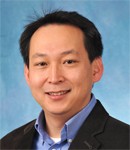
Dr. Zefeng Wang, Assistant Professor in Pharmacology, has received a Jefferson Pilot Fellowship in Academic Medicine. Dr. Wang will receive $20,000 to be paid over a four-year period in equal installments of $5,000 per year. The award is to be used at the discretion of the recipient for support of his/her scholarly endeavors.
The research project which the award will support is described below:
“Precise control of cell cycle progression involves regulation of a large number of genes in a periodic manner. Emerging evidence suggests that cell cycle is controlled by pre-mRNA alternative splicing, however the scope and the mechanisms of splicing regulation in cell cycle remain unclear. We have recently found that a protein kinase, Clk1, play a critical role in controlling splicing during cell cycle through phosphorylating a main class of splicing factors (i.e. SR proteins). Clk1 is a cell cycle regulated protein whose level peaks during mitosis. In addition, we found the inhibition of Clk1 changed splicing in hundreds of genes that are essential for cell division and DNA damage response. These observations led to the hypothesis that the temporal control of splicing plays a key role in regulating cell cycle and that Clk1 mediated SR protein phosphorylation is essential for critical alternative splicing events in normal cell cycle progression. Therefore we will determined the SR protein targets of Clk1 that control cell cycle related splicing events, and further define the temporal control of alternative splicing during cell cycle in a genomic scale.”
The aim of the Jefferson Pilot Fellowship program is to retain promising junior faculty at the University of North Carolina at Chapel Hill School of Medicine. This is accomplished in two ways. First, the recipient of the award, by being named a Jefferson-Pilot Fellow in Academic Medicine, is given public recognition of his/her prior achievements and the School’s confidence in his/her future; second, the monetary award allows him/her a degree of freedom to explore new ideas, new ways of teaching students, treating patients, or investigating biological problems that may not be available from other granting agencies.
Our congratulations to Dr. Wang!
